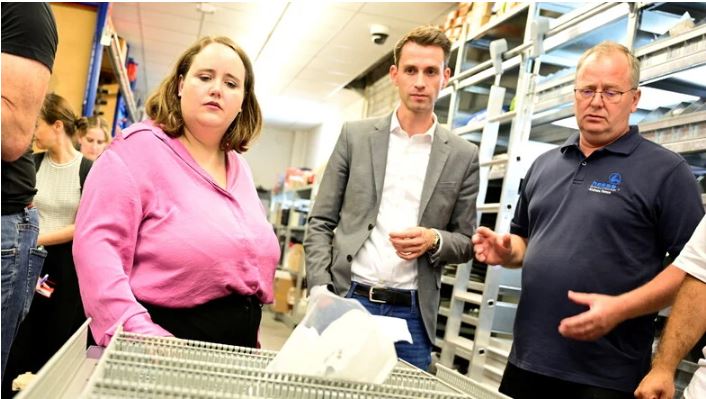From George Moeritz
Dresden. The business of master electrician Andreas Haase in the north of Dresden is buzzing, and the 24 employees have their work cut out for them. As the Green Party's federal chairwoman Ricarda Lang inspected the racks of cables and the charging columns for electric cars on Tuesday, three fitters were bending over plans for the new control system for the energy supply in Dresden's Residence Palace. But despite government contracts, Haase, who is also head of the Dresden Electrical Guild, is not holding back on his criticism of the government.
"Things have been going backwards in Germany for years," Haase says of the top politician whose party is involved in the federal government. The party dispute is generating frustration, he adds. In addition, the master electrician is skeptical about many details of the energy turnaround, even though he did purchase solar technology for his home and then also for his business after a long period of opposition.
For the top politician's visit, Haase superimposes some graphics on a screen: they show how irregularly electricity flows from solar and wind power. "The voltage quality and the grid frequency in Germany are grotty," says Haase.
Lang: The market for green power is huge
Lang, who is from Swabia, initially has some difficulty understanding the Saxon master craftsman and has to ask questions. She shows understanding for the anger about the party squabbles: "Our claim is that these squabbles have to stop," she says. Government politicians have a responsibility to provide security.
When it comes to the energy transition, however, Lang, supported by a companion, counters the Dresden electrician: The expansion of renewable energies is central, along with storage facilities and affordable prices. Now is a transitional phase.
Lang also parries Haase's question as to whether she really knows of anyone interested in steel that has been produced with green electricity. Yes, says Lang, who is currently on a trip to Germany, has visited the Leag lignite site in Schwarze Pumpe and will continue on to Nuremberg and Mannheim in the next few days. The Salzgitter Group and many construction companies want to show off an eco-balance with green power, according to Lang. "The market is huge," says the Green Party leader.
Electrician recommends night storage heating
Haase suggests using night storage heaters again. After all, they could also store energy. But there is hardly any talk of this method, as it lacks the "green credentials. Team Lang" says that precisely such technologies will become important again in the future. In the electricity market of the future, there could be different prices at different times, so it would be worthwhile to shift energy consumption somewhat.
Andreas Brzezinski, Managing Director of the Dresden Chamber of Crafts, also shares his impressions with the politician: He says that it is already clear to people that the earth's resources must no longer be "squandered." But politicians need to set out a vision, for example for life in 2035. It is not enough to say that people should stop driving cars, use heat pumps and not eat meat. What is needed is an overall picture that also includes fun. Brzezinski hands Lang a red towel with a craft logo: this is for wiping away sweat. "We want to see results from the traffic lights!" demands Brzezinski.
Bosch Dresden: Fleece jackets in winter for gas shortage
Lang still wants to know from the craftsmen whether they can find enough new recruits - they are satisfied for this year. However, Haase points out that his journeymen should stay with him after their training if possible - and not migrate to the public sector or industry.
Lang learns that Dresden's industry is growing right now at Bosch's microchip factory, which currently employs 480 people. Site manager Christian Koitzsch shows the guests from Berlin, after they have put on overshoes and hairnets, that there is still room in the plant and that machines are being added bit by bit.

The Green politician learns that a lot of ultra-pure water is used there, but also arsenic and boron. She asks about the consequences of the natural gas shortage last winter. Koitzsch reports cold in the office because the temperature was lowered: "We issued fleece jackets." And technicians did find places to save gas at the plant. "The crisis was also an opportunity."
CDU Saxony visits Chamber of Crafts Dresden
Four weeks ago, Lang's party colleague Robert Habeck, Federal Minister of Economics, had visited Saxony. He was also at a microchip factory and at the craft - in the company of Jörg Dittrich, President of the Saxon Crafts Association in Ottendorf-Okrilla.
The presidium of the Saxon CDU state association was a guest this Monday at the Njumii event center of the Dresden Chamber of Crafts. According to a press release, Handwerkstag President Dittrich said there that Saxony needs vocational schools and dormitories with modern equipment for good vocational training. In addition, the controlled immigration of foreign workers must be "initiated". Small companies needed subsidies for this. The order situation in the construction industry must be stabilized.
During the visit, Saxony's CDU chairman Michael Kretschmer said that Saxony had already taken important measures with the skilled worker pact and the doubling of the master craftsman bonus. He added that the federal government must ease the burden on craft businesses in terms of taxes and bureaucracy. Electricity prices must fall - not just for some large industrial companies, but for everyone.








